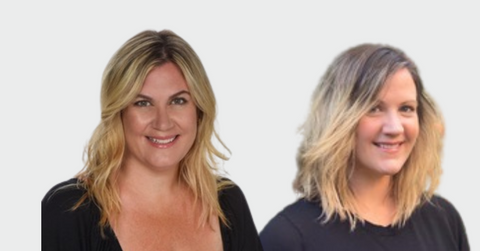Meet Lizzie and Wendy Molyneux, the dynamic sister duo whose creative genius has left a remarkable imprint on the world of television and film. As the masterminds behind the hit animated series The Great North, they serve as creators, showrunners, and executive producers, orchestrating a delightful blend of humor and heart. Their impressive storytelling skills have also shone brightly on FOX’s beloved series Bob’s Burgers, where they not only captured an Emmy Award in 2017 but also secured ten Emmy nominations. Their talents further garnered them three Writers Guild Award nominations and a coveted Annie Award for the unforgettable episode ‘The Hormone-iums.’
On the feature side, they recently adapted the novel ‘The People We Hate at the Wedding’ into a movie starring Allison Janney, Kristen Bell, Ben Platt, and Cynthia Addai-Robinson.
Her Agenda engaged in an inspiring conversation with the Molyneux sisters as they discussed their commitment to creating diverse, empowering stories and navigating the animation industry as women creators.
Her Agenda: Tell me how you got into film and animation.
Wendy Molyneux: I’m older, so I was out of college first, and was working, but not working. Improv cannot be necessarily called working, but I had gotten into the improv comedy scene. And I’d done a little bit of writing, and then even actually before Lizzie graduated, we wrote a screenplay together that was never made, but we realized that we liked working together. When she graduated, that’s when we started trying to get into the business. We got a manager and spent a few years unemployed, and then wound up getting read for Bob’s Burgers and hired there. And that was our first job together. I had other media jobs, but that was our first one we had together.
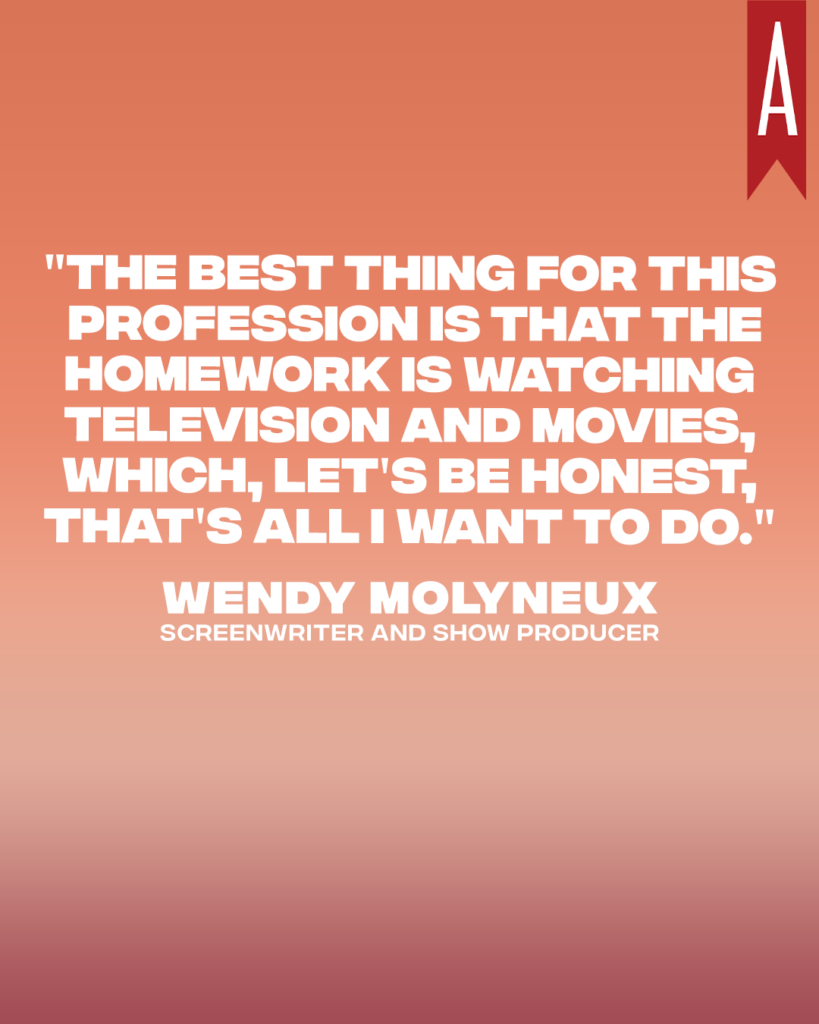
Her Agenda: What’s it like working so closely with your sister?
Lizzie Molyneux: It’s great. The thing about a writing partnership is you really need to have a similar sensibility. Obviously, we have such a big shared experience in our lives. So I think there’s just a shorthand for us that makes it really easy and fun to work together. We get that question all the time, but there are two other siblings in between us. So we have a little bit of a buffer, we didn’t grow up competing or going to school at the same time, things like that. So for us, it’s really easy and fun. Also, we can’t break up as a partnership because imagine how awkward Christmas could be. So we have a high incentive to stay together as a team.
Her Agenda: What inspired ‘The Great North’ and why set a show in Alaska?
Wendy Molyneux: What inspired ‘The Great North’ came from thinking about the cast, because we knew we wanted to work with Nick Offerman. We have a long history of working with Megan Mullalley and Nick Offerman. So we really wanted to work with Nick on something. Megan, at that time, was busy on the Will and Grace reboot. So we were really targeting Nick. Then Jenny Slate, who we’ve worked with on Bob’s Burgers, we started to think of them as a father-daughter, because of their energies just seemed to be interesting because she’s got such a sort of active, excitable energy and Nick has this very stolid, kind of more thoughtful energy, or not more thoughtful, just a solid kind of, more deliberate energy, and we thought there could be an interesting pairing. And then we thought, okay, how do we make this father-daughter a little bit different? And we also wanted to get a geographically far feel from where Bob’s Burgers takes place, because we were coming off of a decade of working on Bob’s. And that’s where the Alaska piece came into it, really generated by Liz.
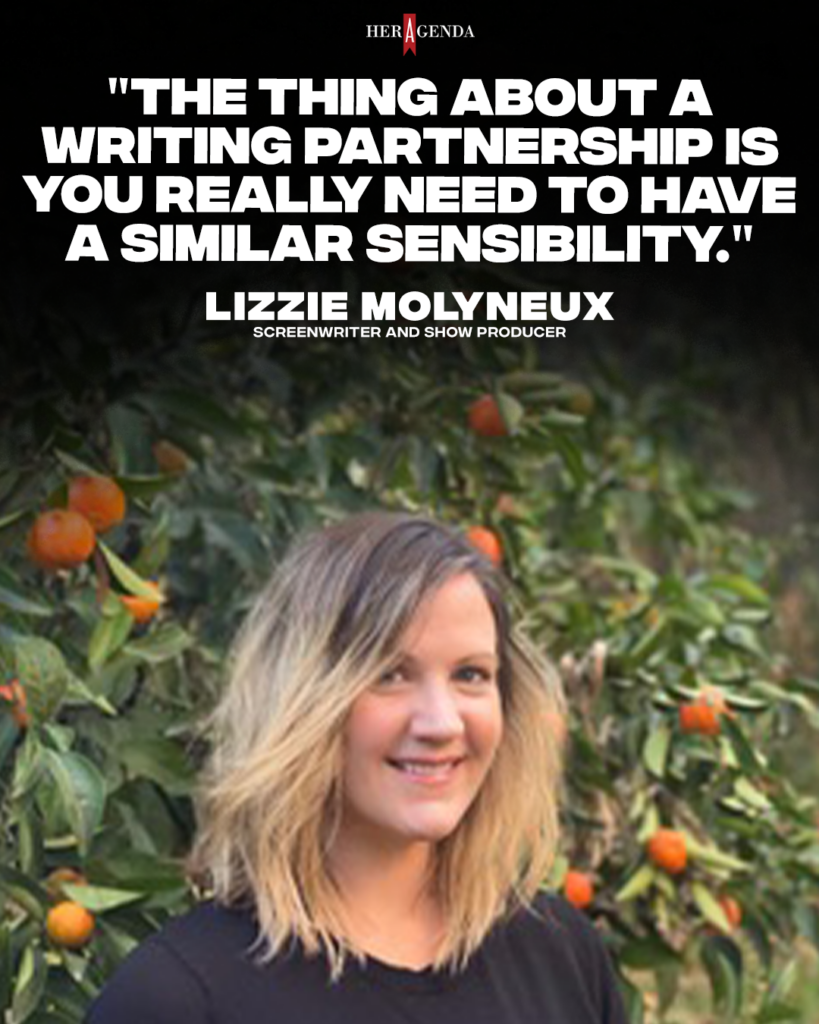
Lizzie Molyneux: Yeah, I had this experience. I have recently visited Alaska when we were starting to come up with the show and start to really develop it. It’s such a cool experience to go there and sort of see how truly different it is from any other state in the U.S., it is so vast and so enormous and there is so much nature just right outside your doorstep, no matter where, even if you’re in like a city like Anchorage, it’s just a very different experience. We had this idea for Judy, for Jenny Slate’s character, kind of being a kid in a small town and wanting something bigger and having this big imagination and these big dreams. It felt like a lot of small-town America has been explored on various TV shows and movies. That felt to us like something a little different and a little interesting, like for ourselves to sort of picture ourselves, up in that area, trying to make it out and out into the world, even though it’s such a large place, it’s a big place full of small towns. It just felt very interesting as a jumping-off point.
Her Agenda: ‘The Great North’ is currently the only adult cartoon made/produced by mainly women since Tuca and Birdie was cancelled. So what are some struggles and biases you’ve felt in this industry?
Wendy Molyneux: We’ve been really lucky in a lot of ways. The ‘Bob’s Burgers’ environment was always insanely positive for women. From day one, it started with two male showrunners, Loren Bouchard and Jim Dauterive, who could not have been more encouraging. It was like there was no difference. Like, everything was very chill. And now Loren has, as his two showrunners, Holly Schlesinger and Nora Smith, who are both women. And so that environment for women couldn’t be more positive. Because we’re an all-female creative-led show, obviously, we’ve tried to replicate that for women in our show.
I think the only times we’ve encountered [bias] are outside of this environment. We’ve heard, at times, you hear some things that almost make you gasp, like someone who said, like, well, can they write male characters? The show is called BOB’s Burgers. Occasionally, you just hear something that almost takes your breath away, but not from inside our animation bubble that we’ve been in, but we have encountered that outside when we’ve gone out for other jobs. Then I do think there are sometimes people who assume that just because you’re writing it, some things’ sensibility is female. Of course, de facto, we are women, writing the show, so it has to be female sensibility, in a way, but it’s also just a particular comedic sensibility. Everything written by a man, you don’t go, oh, that’s automatically a male sensibility for men or whatever. Sometimes that comes into play. The struggle is always to be viewed in some ways at the same time, as a woman writing for women, wanting women to be really interested in what you’re writing, of course, and never screwing women over. But also because this is our job. We work in Hollywood. We’re the same as men. What we write is also for everyone. When people want to pigeonhole it as if we’re writing things that men can’t possibly identify with, that feels strange because, of course, we’re professional comedy writers. We’re writing it for everyone. Hopefully, the biggest audience possible.
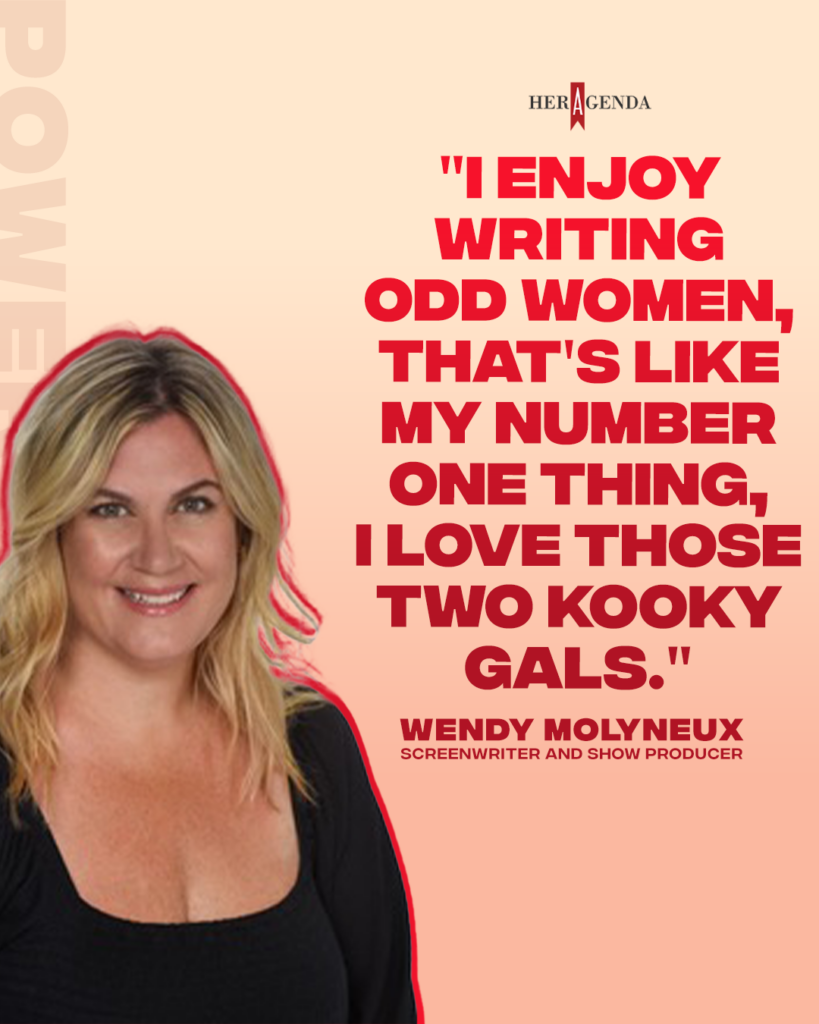
Lizzie Molyneux: There’s always times where you’ll butt up against a little bit of a struggle or pushback. I don’t think we’ve experienced it really in our career at Bob’s or on the Great North, but we’ve gone out for other things and it’s always, as a woman, when you feel that feeling of like a little pushback or a little bit of extra scrutiny, I think it’s wild to believe that you’re imagining it. It exists in the world, but we’ve been really lucky. At the end of the day, both shows are truly family shows. They’re for anyone who’s had a family, grown up in a family, and that’s our focus is always, as Wendy said, a show for everyone. There are a lot of different angles to it. The younger characters, older characters, kids, and parents. That’s our focus, trying to appeal to that comedy of everyday life.
Her Agenda: Besides the award-winning episodes, what do you think is a special episode from your resume?
Wendy Molyneux: Oh, from our resume? Well, we wrote the upcoming finale of ‘The Great North’ Season 5, and I think we really put our heart and soul into that. And then what else from Bob’s that are close to? Well, I would say Art Crawl, which is the first one that we wrote. For me, Art Crawl where Gail paints animal anuses. It was our first year on Bob’s. It was the first episode of television that Lizzy and I ever wrote together that aired. It kind of embodies what we like to do and how we like to write, and is just a special memory for us sisters.
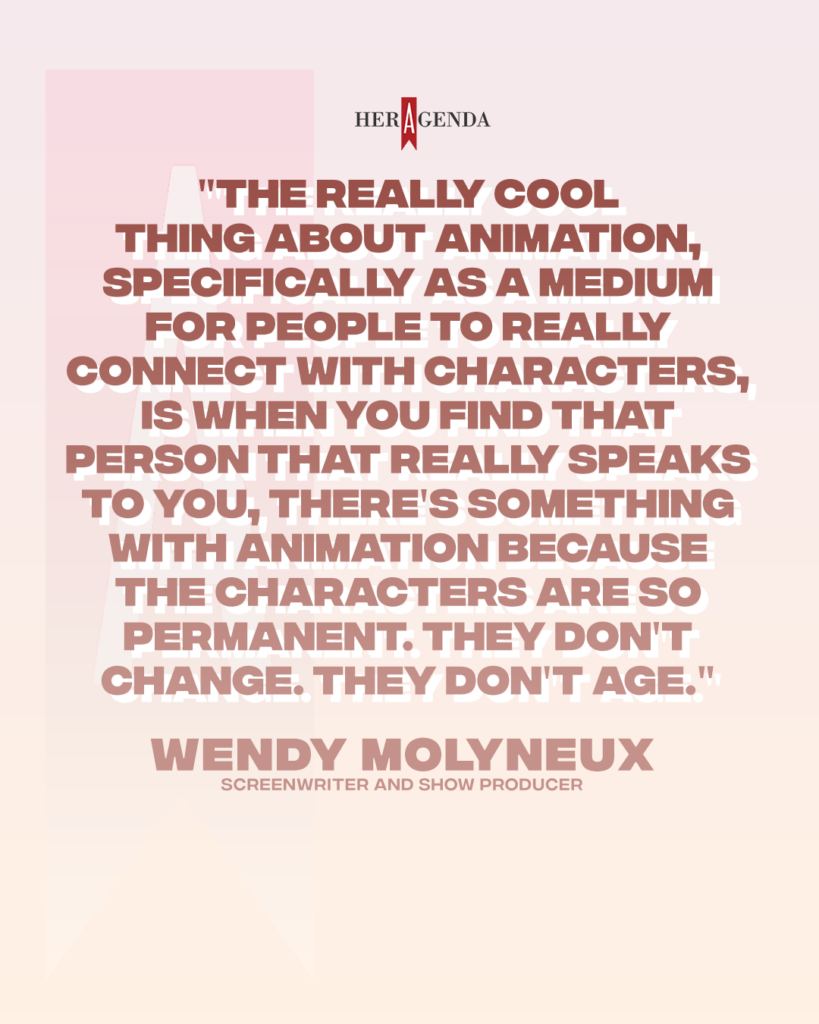
Her Agenda: Which female characters are you the most proud of and their development?
Lizzie Molyneux: I’m very proud of Judy Tobin as a character. There was something in creating the show and developing that character; there are elements of both of our personalities in her. That teenage girl who can be really ambitious and funny and smart, there’s many examples of it, but I think just to be another show that can sort of put a character like that forward front and center, is really great because that is a type of character that I related to when I was that age, when I was in high school. Jenny Slate is just on, she’s so funny, and I think to allow Judy to sort of take on pieces of just who Jenny is too, and what she finds funny and how she expresses herself, she’s hilarious, so to allow Judy to be the character that can burp and fart and laugh at everything and just be very sort of vocal with everything she wants, I think it’s fun. It’s been a really great experience to get to bring her to life and see her on TV.
Wendy Molyneux: In the Bob’s world, I think the two characters that I feel proud of having introduced in our episodes are, of course, Gail from Art Crawl. I think Gail is insane in the best possible way. I’m kind of like Gail in some way, so I enjoy writing for Gail because Gail is afraid of everything, and so am I. And we moved to work with Megan Mullally, and she plays Gail, and so it just feels very close to my heart. And then the character of Nat the limo driver, who’s played by Jillian Bell. Nat is so, she lives her life the way that she wants. She’s a single lady who drives a pink limo around town and doesn’t take shit from anyone, and always has new interesting things to discover about her. We’ve just written another episode with her that will be in season 15. So we literally just recorded Jillian like last week for that one. Those are two of the female characters that I enjoy writing. I enjoy writing odd women, that’s like my number one thing, I love those two kooky gals.
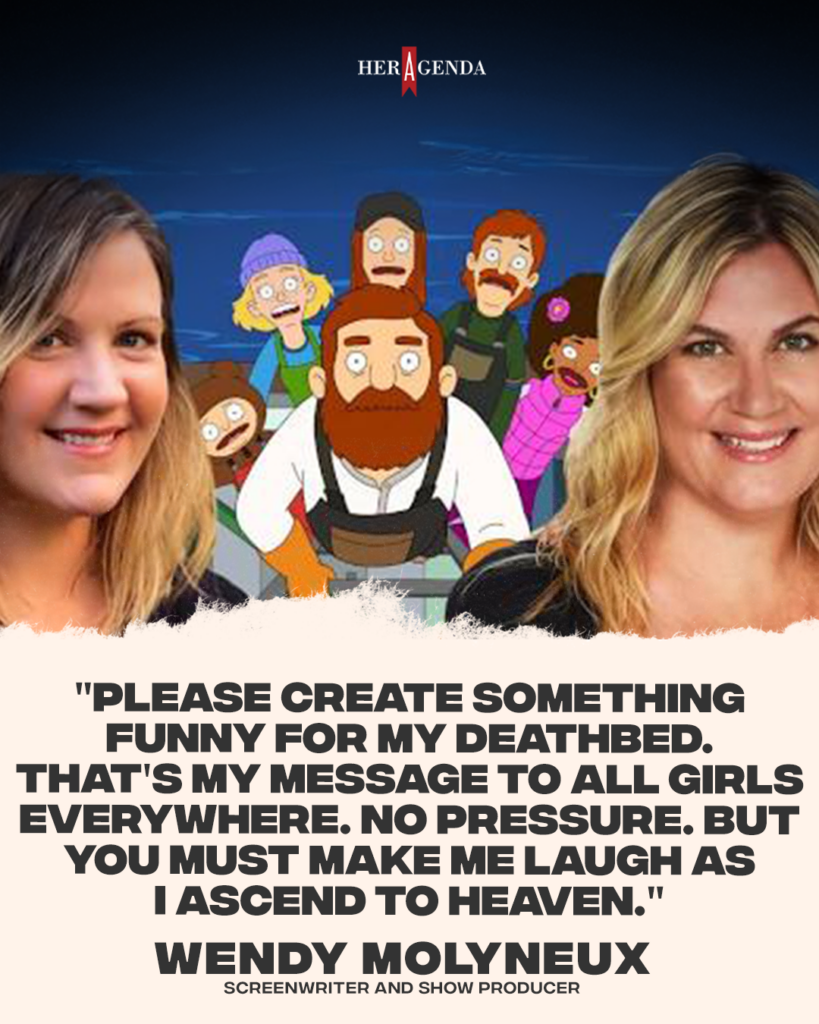
Her Agenda: How does animation influence people’s perceptions of gender and gender roles?
Wendy Molyneux: I have a non-binary child who goes by he/they, and he just really identifies with a lot of the characters on Great North. He absolutely loves Aunt Dirt, who has a bit of a sort of androgynous spirit. It’s been cool to see that in real time. I think Bob’s was one of the first primetime animations to really have female characters who were super centered and were not there to be made fun of. In fact, they were funny. That’s an important difference. That was why Lizzie and I were so excited to get a job on that show and then to create Great North where people across all kinds of genders and sexualities are represented and get to be funny and are not there as objects of fun. It just feels like the proliferation of animation, and that more streamers, et cetera, are doing animation.
There’s a chance for everyone to see a reflection of themselves. That hopefully then will encourage more women, more non-binary people, just more people from all kinds of backgrounds to go into animation because the more people that go into animation with different backgrounds, the more we’re going to see shows and characters, and a deepening of what types of animation we’re seeing. The really cool thing about animation, specifically as a medium for people to really connect with characters, is when you find that person that really speaks to you, there’s something with animation because the characters are so permanent. They don’t change. They don’t age. There’s something sort of almost like mascoty about them. When you find a character that you truly connect with in that way, especially for younger people, it can feel like a big sort of support system and backing. There’s this ability with animation too, if you find your character or your show or whatever it is that truly connects for you, there’s a world sort of built out from it because animation is so, in a lot of cases, cute and fun, and there are memes and products. There’s this sense of sort of belonging to you, and your belonging to it can be kind of impactful for a lot of people when you find that thing that you truly love.
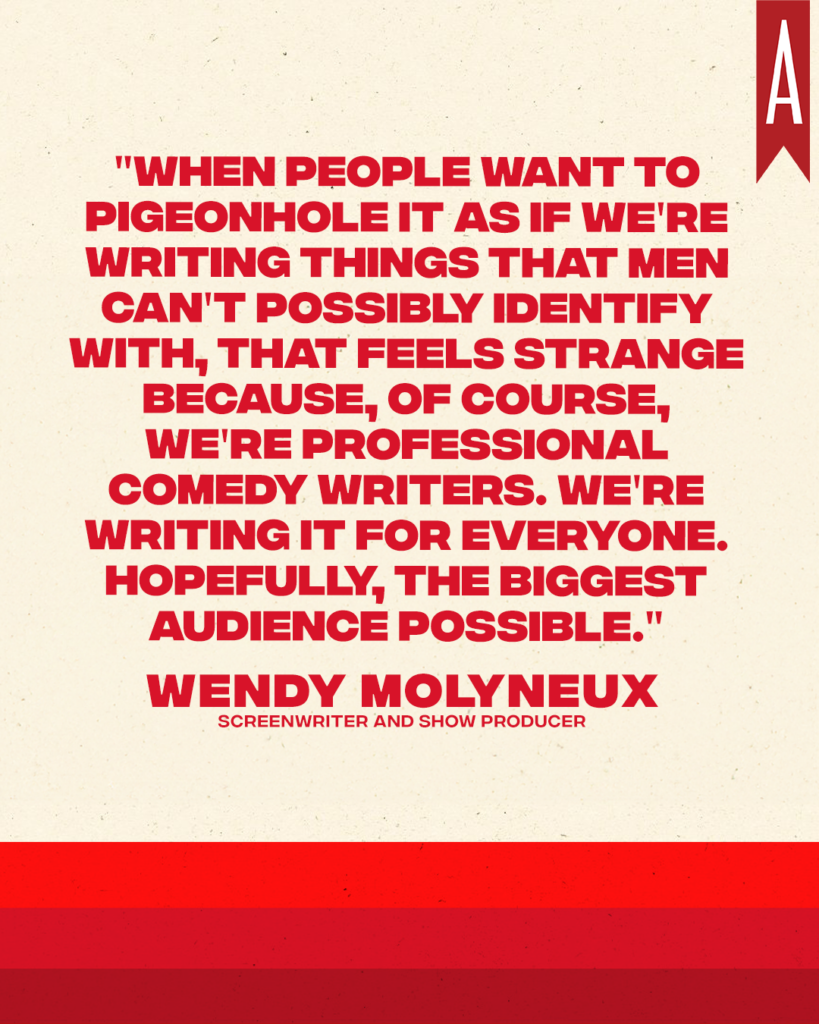
Her Agenda: Are there any special messages that you hope to send female audiences in particular when watching your shows?
Wendy Molyneux: It’s okay to be funny. That wasn’t a path when I was growing up. Like, there wasn’t, like, oh, here’s something you can do with your life, is you can be in comedy. I’m older. And I don’t think it felt as wide open. And so I think there are those girls out there who are maybe watching these shows. I just hope that some of them choose to go into the field because by the time they’re adults, I’ll be too old to make it anymore, and I want something to laugh at when I’m on my deathbed. Please create something funny for my deathbed. That’s my message to all girls everywhere. No pressure. But you must make me laugh as I ascend to heaven.
Her Agenda: How have African American women and other minority people responded to characters like Honey Bee?
Wendy Molyneux: I think Honeybee has been pretty universally beloved. If anyone knows the actress behind Honey Bee, Dulce Sloan, she’s just a volcano of comedy. When she hops on to record, she’s talking about her life, and everyone is laughing so hard, we can barely get to recording the episode. She really shines as a standout in the cast. The response has just been universally positive. A lot of that comes from Dulce herself because she’s strongly and unabashedly herself and brings that to the screen. I think people just love it.
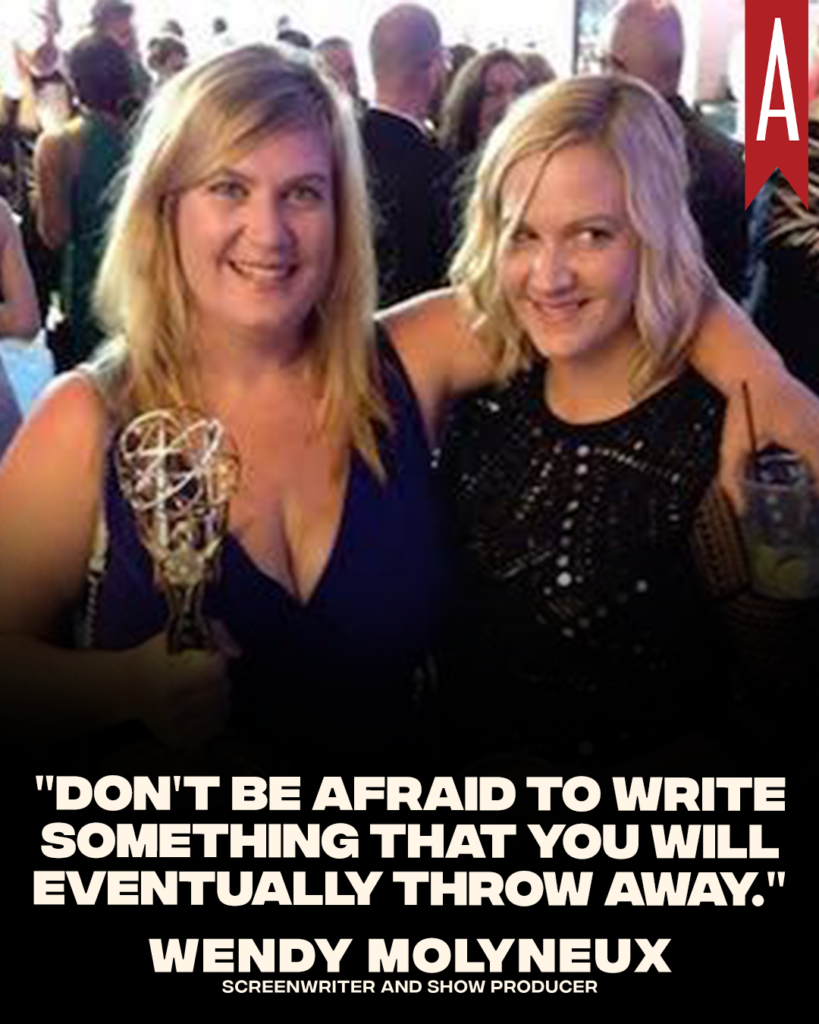
Her Agenda: Do you have any specific advice for people interested in screenwriting?
Wendy Molyneux: I mean. Just start.
Lizzie Molyneux: I will say for myself, I didn’t ever take any screenwriting classes in college. I knew it was a career, but it wasn’t something that was really on my radar as something that might work for me or something that I should look into. I was a little aimless as I think a lot of people are when they’re in college or first starting out, but I think if it’s an interest, just starting is great, watching a lot of things that are sort of [the] area you want to go into, whether it’s comedy or drama or horror whatever, there’s so much.
That’s the thing about film and TV right now, there’s just so much of it, and there’s so much good stuff to watch and to learn from, from extremely independent things to obviously huge blockbuster movies. There’s just so much of it out there. There are so many more voices that can be expressed. There’s a need for even more of it. It’s just kind of figuring out which way you want to go and starting out and giving it a try. From my own experience, once I dipped my toe into it, I was like, oh, I love this, and I want to keep doing it. And the more you do it, you’re always learning, you’re always getting better at it, hopefully. There’s nothing really, there’s no other way to learn it but to start doing it.
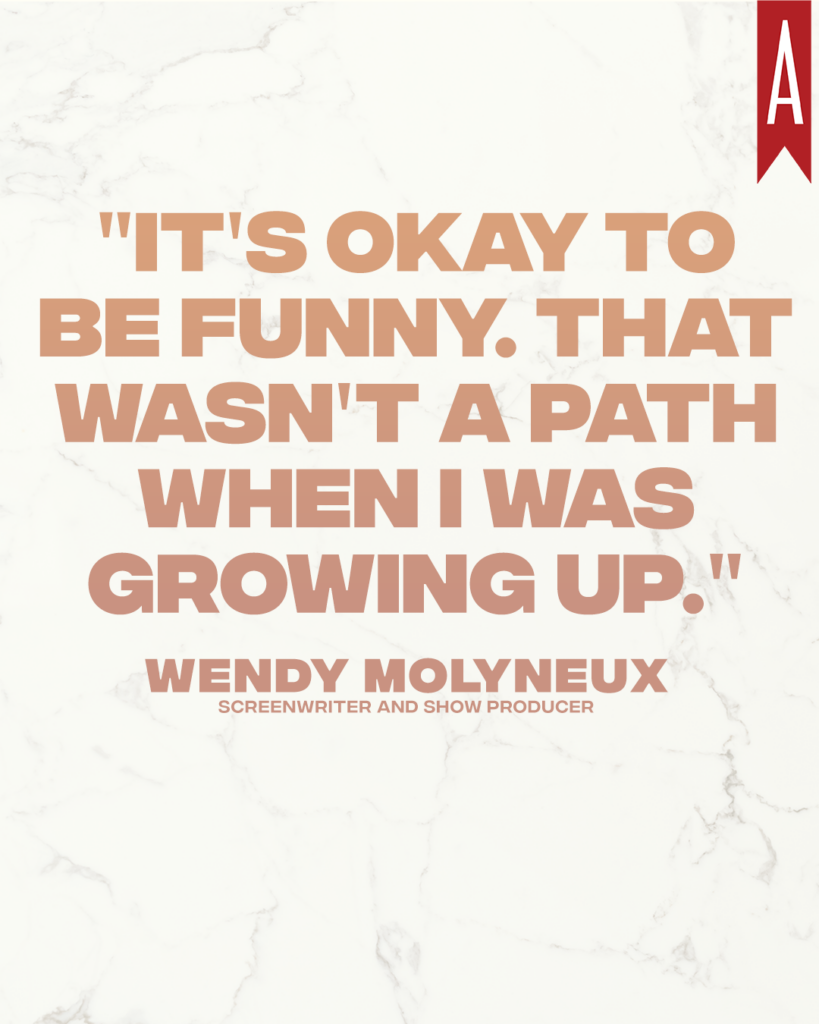
Wendy Molyneux: Yeah. Don’t be afraid to write something that you will eventually throw away. Lizzie and I have thrown away, and I’m not kidding…thousands and thousands and thousands of pages of material over the course of our career. And we’re not done. We plan to throw more away in the future. It’s just that’s part of the writing process, you have to make one thing as a stair step to making the other things. And any failure that you have is just there to show you, okay, well, that wasn’t the one, but keep going. If somebody comes with me, they’re like, but I’ve written three scripts and nothing sold. I’m like, yeah, baby, you’re going to write 12 more because that’s what we have had to do. You have to kind of stay in the game and keep learning and growing. The best thing for this profession is that the homework is watching television and movies, which, let’s be honest, that’s all I want to do. Again, I want to lay in bed and watch television and movies. That’s my number one goal. I have four kids, so I don’t get to do it that often. But it’s the best homework in the world. And so you’re in a profession where the work that you have to do, it’s not like being a boxer where you have to go hit the heavy bag. You just have to binge a series in one day. It’s pretty terrific.
[Editor’s note: This interview has been edited for length and clarity.]

